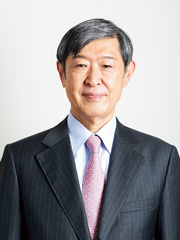
JICA's Commitment to Achieve Human Security around the World
- KITAOKA Shinichi
Profile:
Dr. KITAOKA Shinichi is President of the Japan International Cooperation Agency. Before assuming the present post, he was President of the International University of Japan (2012-2015). His career includes Professor of Graduate Schools for Law and Politics, the University of Tokyo (1997-2004, 2006-2012) and Ambassador Extraordinary and Plenipotentiary, Deputy Permanent Representative of Japan to the United Nations (2004-2006). His specialty is modern Japanese politics and diplomacy. He obtained his B.A. (1971) and his Ph.D. (1976) both from the University of Tokyo. He is Emeritus Professor of the University of Tokyo and Rikkyo University.
Our Commitment to Human Security
Since the late 1990s, the Government of Japan has made Human Security one of its foreign policy pillars. When Madame OGATA Sadako became JICA's President in 2003, JICA adopted Human Security as its guiding principle. Ever since then, Human Security has remained at the heart of our operations and is now one of our agency's core missions.
More recently, when we updated our approach to this concept in 2019, we revisited the core principles of Human Security. The heart of this concept is that all individuals are entitled to freedom from fear, freedom from want, and the freedom to live in dignity, and that the global community and each country must prioritize building a world that secures these essential freedoms. Toward that goal, we identified how to better realize Human Security and summarized this approach into a document titled, "Revisiting Human Security in Today's Global Context."
Achieving Human Security
JICA's approach toward cooperation is rooted in our engagements with partner countries as equals that share mutual respect. In promoting Human Security, JICA emphasizes the need to empower individuals, organizations, and societies through human resource development and institution building, while respecting local ownership and self-reliance.
In our efforts to advance institution building, JICA has focused on building resilient societies that can protect themselves against various threats. We aim to build social systems that are better prepared to prevent and mitigate the impacts of downside risks to sustainable development, including violent conflict, natural disasters, and pandemics.
This approach is exemplified in our work to bring peace and development to Mindanao. This region of the Philippines has suffered from decades of conflict and is working to overcome a complicated history to establish a peaceful society. JICA began its cooperation in Mindanao long before the 2014 peace agreement, and we remain committed to the capacity building of the transitional autonomous government and for the socioeconomic development of local communities to attain self-reliance. Working together with local authorities and communities, we hope Mindanao will strengthen the resilience of its social systems to achieve sustainable peace and development that realizes Human Security for all.
Looking Ahead
Amid the COVID-19 crisis, JICA remains steadfast in its mission to achieve Human Security for all. To do this, we will promote a holistic approach that protects the life and health of every individual through a combination of prevention, precaution, and treatment.
JICA will also continue to strengthen our efforts to identify various threats to Human Security and address these challenges. We will continue to promote human resource development and institution building, while also encouraging innovation and partnerships, to build resilient social systems that ensure the rights of all individuals to "live free from fear and want, and in dignity."




scroll